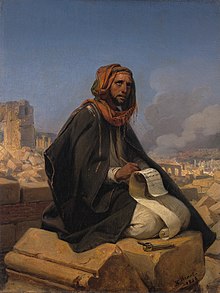
The Book of Jeremiah is the second of the Latter Prophets in the Hebrew Bible, and the second of the Prophets in the Christian Old Testament. The superscription at chapter Jeremiah 1:1–3 identifies the book as "the words of Jeremiah son of Hilkiah". Of all the prophets, Jeremiah comes through most clearly as a person, ruminating to his scribe Baruch about his role as a servant of God with little good news for his audience.
The Book of Obadiah is a book of the Bible whose authorship is attributed to Obadiah. Obadiah is one of the Twelve Minor Prophets in the final section of Nevi'im, the second main division of the Hebrew Bible. The text consists of a single chapter, divided into 21 verses with 440 Hebrew words, making it the shortest book in the Tanakh, though there are three shorter New Testament epistles in Greek. The Book of Obadiah is a prophecy concerning the divine judgment of Edom and the restoration of Israel.

In religion, a prophet or prophetess is an individual who is regarded as being in contact with a divine being and is said to speak on behalf of that being, serving as an intermediary with humanity by delivering messages or teachings from the supernatural source to other people. The message that the prophet conveys is called a prophecy.
The Nevi'im is the second major division of the Hebrew Bible, lying between the Torah and Ketuvim. The Nevi'im are divided into two groups. The Former Prophets consists of the narrative books of Joshua, Judges, Samuel and Kings; while the Latter Prophets include the books of Isaiah, Jeremiah, Ezekiel, and the Twelve Minor Prophets.
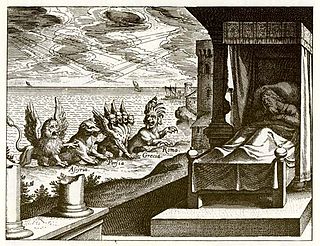
Apocalyptic literature is a genre of prophetical writing that developed in post-Exilic Jewish culture and was popular among millennialist early Christians. Apocalypse is a Greek word meaning "revelation", "an unveiling or unfolding of things not previously known and which could not be known apart from the unveiling".
Bible prophecy or biblical prophecy comprises the passages of the Bible that are claimed to reflect communications from God to humans through prophets. Christians usually consider the biblical prophets to have received revelations from God.

The threefold office of Jesus Christ is a Christian doctrine based upon the teachings of the Old Testament of which Christians hold different views. It was described by Eusebius and more fully developed by John Calvin.
The protocanonical books are those books of the Old Testament that are also included in the Hebrew Bible and that came to be considered canonical during the formational period of orthodox Christianity. The Old Testament is entirely rejected by some forms of Gnosticism, but the Hebrew Bible was adhered to even more tightly by Jewish Christians than Gentile Christians. The term protocanonical is often used to contrast these books to the deuterocanonical books or apocrypha, which "were sometimes doubted" by some in the early church, and are considered non-canonical by most Protestants.
The books of the New Testament frequently cite Jewish scripture to support the claim of the Early Christians that Jesus was the promised Jewish Messiah. Scholars have observed that few of these citations are actual predictions in context; the majority of these quotations and references are taken from the prophetic Book of Isaiah, but they range over the entire corpus of Jewish writings.
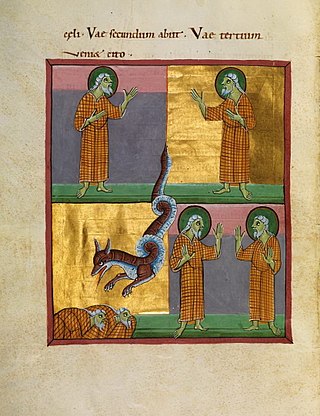
The two witnesses are two literary figures who are mentioned in Revelation 11:1-14. Some Christians interpret this as two literal people, such as Moses and Elijah or Saint Peter and Saint Paul. Others interpret this as a symbol for a group or groups of people, such as the Christian church or the Jews and the Christians. Still others interpret this as a symbol of two concepts, such as the Torah and Nevi’im or the Old Testament and New Testament. The earliest interpretation of the two witnesses is that they are Enoch and Elijah, the only two that did not see death as required by the Scriptures. Hippolytus of Rome is the first commentator to unambiguously present this view.
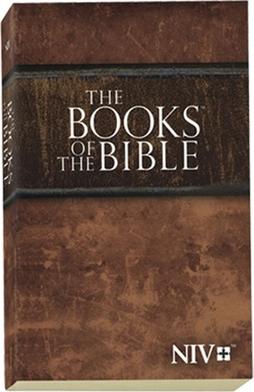
The Books of the Bible is the first presentation of an unabridged committee translation of the Bible to remove chapter and verse numbers entirely and instead present the biblical books according to their natural literary structures. This edition of the Bible is also noteworthy for the way it recombines books that have traditionally been divided, and for the way it puts the biblical books in a different order.
Prophets in Islam are individuals in Islam who are believed to spread God's message on Earth and serve as models of ideal human behaviour. Some prophets are categorized as messengers, those who transmit divine revelation, most of them through the interaction of an angel. Muslims believe that many prophets existed, including many not mentioned in the Quran. The Quran states: "And for every community there is a messenger." Belief in the Islamic prophets is one of the six articles of the Islamic faith.
Matthew 27:9-10 are the ninth and tenth verses of the twenty-seventh chapter of the Gospel of Matthew in the New Testament. These verses end the final story of Judas Iscariot, with a quotation from scripture showing how the events around his final days were predicted.
The following outline is provided as an overview of and topical guide to the Bible:

Jeremiah 1 is the first chapter of the Book of Jeremiah in the Hebrew Bible or the Old Testament of the Christian Bible. This book, one of the Nevi'im or Books of the Prophets, contains the prophecies attributed to the prophet Jeremiah. This chapter serves as an introduction to the Book of Jeremiah and relates Jeremiah's calling as a prophet.
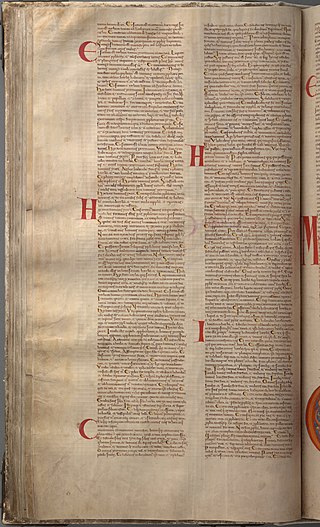
Zechariah 12 is the twelfth of the 14 chapters in the Book of Zechariah in the Hebrew Bible and the Old Testament of the Christian Bible. This book contains the prophecies attributed to the prophet Zechariah, and is a part of the Book of the Twelve Minor Prophets. This chapter is a part of a section consisting of Zechariah 9–14. This chapter and chapter 13 verses 1–6 are a section, forming a three-section "entity" with 13:7–9 and 14:1-21.

Zechariah 3 is the third of the 14 chapters in the Book of Zechariah in the Hebrew Bible or the Old Testament of the Christian Bible. This book contains the prophecies attributed to the prophet Zechariah. In the Hebrew Bible it forms part of the Book of the Twelve Minor Prophets. This chapter records a vision of Joshua, the high priest, being cleansed before God. It is a part of a section consisting of Zechariah 1–8.

Zechariah 1 is the first chapter of the Book of Zechariah in the Hebrew Bible or the Old Testament of the Christian Bible. This book contains the prophecies attributed to the prophet Zechariah. In the Hebrew Bible it forms a part of the Book of the Twelve Minor Prophets. As the first of the 14 chapters in the book, this chapter is a part of a section consisting of Zechariah 1-8. It records an introduction and the first two of the eight visions received by the prophet. These visions are the book's primary and most distinctive feature, with a highly literary and standardized format, structured in a concentric pattern.

Zechariah 7 is the seventh of the 14 chapters in the Book of Zechariah in the Hebrew Bible or the Old Testament of the Christian Bible. This book contains the prophecies attributed to the prophet Zechariah. In the Hebrew Bible it is part of the Book of the Twelve Minor Prophets. This chapter is a part of a section consisting of Zechariah 1–8. The Jews having sent to inquire concerning the set fasts, Zechariah 7:1-3, Zechariah reproves the hypocrisy of their fasts, Zechariah 7:4-7, and they are exhorted by repentance to remove the cause of their calamity, Zechariah 7:8-14.
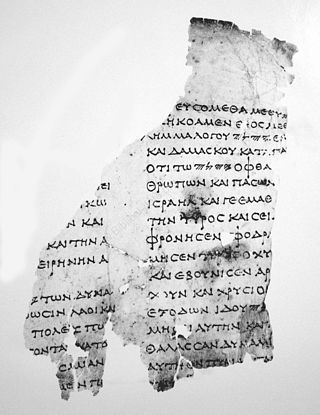
Zechariah 8 is the eighth of the 14 chapters in the Book of Zechariah in the Hebrew Bible or the Old Testament of the Christian Bible. This book contains the prophecies attributed to the prophet Zechariah. In the Hebrew Bible it is part of the Book of the Twelve Minor Prophets. This chapter concludes the so-called "First Zechariah", consisting of Zechariah 1–8, and brings together ten "short independent oracles", each referring to the word of "the Lord of Hosts".


